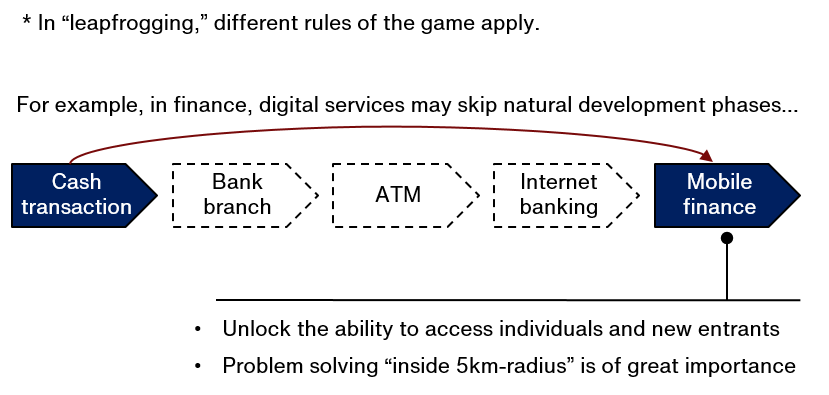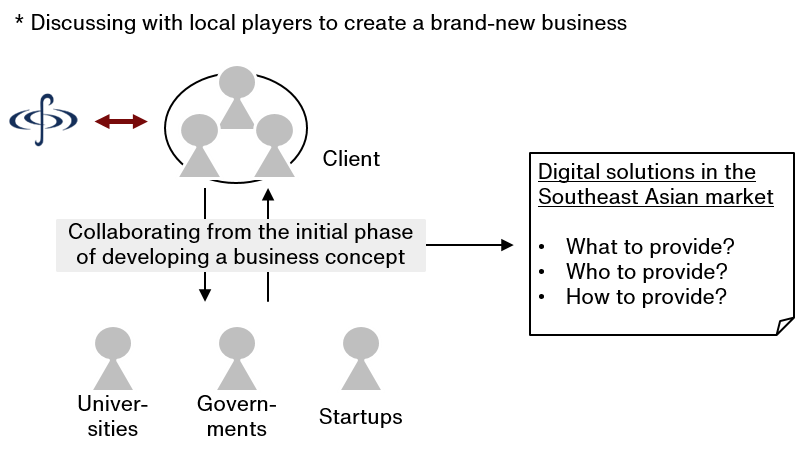
Social transformation in Southeast Asia, the land of disruption & innovation
In Southeast Asia, we usually observe “leapfrogs” – fast-spreading digital technology, together with underdeveloped infrastructure, leads to nonlinear growth in digital services. This phenomenon exposes existing businesses to significant risk. Below, we share a story of the challenge by a Japanese global company that IGPI supported.
Transforming to keep up with “leapfrogs” – How should we challenge them? Who should we collaborate with?
IGPI supports Japanese multinational companies’ transformation in Southeast Asia and adapting to local society and the economy. This is neither exporting Japanese-style business nor delegating full responsibility to local subsidiaries. In this example, IGPI worked with the client to create a brand-new business that was never seen locally by cooperating with local partners.
The client company has provided B2B digital solution services in the region for many years. However, digital services in Southeast Asia have undergone significant structural changes in recent years. Smartphones spread rapidly, unlocking the vast potential to access individuals for small teams and new entrants. This made problem-solving “inside a 5km-radius” necessary or made providing digital services and solutions in a localized area assume greater importance due to the vulnerability of existing infrastructure and largely different commercial practices among regions.

In these societies, startups and local conglomerates have a significant presence. For example, Vietnam’s Vingroup entered EV manufacturing and the taxi business, leading to a demand boom for such vehicles and services. We see the same phenomenon in China, where over 300 EV manufacturers exist.
“Can our current digital solutions business remain profitable in the future?” This crisis prompted the client to engage IGPI’s support.
Departing from “in-house,” collaborating with local industries, universities and government – IGPI’s initiatives for discontinuous change
The project’s scope was to create a brand-new business to form a new pillar of profitability for the client. Through IGPI’s support, the client understood the importance of departing from an “in-house” approach. Although multinational companies possess plenty of resources, they are not always strong in adapting to nonlinear changes. The same systems supporting existing organizations’ perpetual growth could also hinder fundamental reform.
From the early stages of developing this business concept, the client and IGPI sought to collaborate with universities, governments, local enterprises, and startups in Southeast Asia. Once we built the hypotheses on solutions and completed an initial verification, we immediately approached potential business partners to discuss if collaboration was possible before refining these hypotheses rapidly and flexibly.
Travel to these Southeast Asian countries was not possible during the pandemic period in 2020. IGPI and the client faced numerous challenges in contacting players in Indonesia and Vietnam and convincing them of the benefit of the collaboration through online meetings. After multiple discussions with potential partners, IGPI managed to find multiple potential interested business partners.

Through this, a traditional Japanese large company managed to break away from an “in-house” approach and adopt an agile approach to developing a new business via discussions with local partners from an early stage in developing the business concept. This marked a watershed moment, where the organization and corporate culture of the client started to transform.
Digital thinking to overcome vested interests – The impact on businesses and the economy
Underdeveloped infrastructure is one of the key factors that enable “leapfrogging.” However, all is not always smooth sailing, and there are some obstacles impede transformation in Southeast Asia.
For example, 3.5 million one-man stores in Indonesia support the day-to-day lives of 270 million people. The supply chain for these stores is multi-layered and complicated. Though it would be efficient to streamline this, reform would not be straightforward as the existing supply chain and infrastructure comprise many essential parties and stakeholders with vested interests in maintaining the status quo.
IGPI aims to bring about transformation for such social challenges through digital thinking. Dissecting and improving existing frameworks require much time and social costs. It may be more important and efficient to consider how user behavior can be changed by applying existing frameworks.
With IGPI’s support, the client successfully built this digital service. However, our foray into the stormy seas of disruption and innovation by leading Japanese multinational companies has only just begun.


